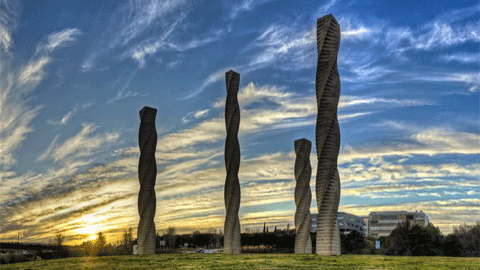Twelve innovative UAB projects awarded by the Knowledge Industry Programme
In 2024, the UAB received 950,000 euros from the Government of Catalonia's Knowledge Industry programme to boost the valorisation and transfer of 12 research projects.

The Knowledge Industry programme, promoted by the Department of Research and Universities of the Government of Catalonia, aims to promote an economic model based on knowledge, encouraging the transfer of research results from the different centres of the Catalan science and innovation system. The programme offers grants in different phases of the valorisation and transfer process, which are specified in the modalities Llavor, Producte and Innovadors.
In 2024 the UAB attracted funds amounting to 953,625 euros. In the Llavor modality, which seeks to support innovative projects with potential for incorporation into the productive sector, a total of six projects of the University were selected to receive grants of a total of 120,000 euros. The projects are as follows:
- PRODIGY: Engineering a Probiotic for Parkinson’s Disease, liderat per Salvador Ventura from the Institute of Biotechnology and Biomedicine (IBB).
- META-BEAT: Microbial enzyme targeting metabolism for cancer treatment, led by Esther Julian from the Department of Genetics and Microbiology.
- Non-volAtile memRisTive swItches For hIgh frequenCy opEration, led by Jorge Andrés Verdú from the Department of Telecommunications and Systems Engineering.
- PrevGut: Preventing Toxic Protein Aggregates in the Gut, led by Natalia Sánchez from the Department of Biochemistry and Molecular Biology.
- LexiCat: Developing tests for receptive and productive vocabulary skills in Catalan, led by Adriana Soto from the Department of English and German Studies.
- PHAGEs_SI: Phage-based solutions to combat Salmonella Infantis in poultry production, led by Susana Campoy from the Department of Genetics and Microbiology.
In the Producte modality, aimed at projects for obtaining prototypes and the valorisation of research results generated by research teams in Catalonia, the programme awarded five projects with grants amounting to 749,625 euros:
- HeliCure: Towards a new therapy for Parkinson’s Disease, led by Irantzu Pallarès from the Department of Biochemistry and Molecular Biology.
- TAR-NK-UAB: Development of a TGF-ß- and Activin A-Resistant off-the-shelf NK cell product for cancer treatment, with Aura Muntasell from the IBB, as principal investigator.
- NanoERT: nano-delivery platform for Enzyme Replacement Therapy in Parkinson’s and Gaucher’s disease, headed by Julia Lorenzo from the IBB.
- NEURORESOLVING: Neuroresolving therapy for Amyotrophic Lateral Sclerosis, led by Rubèn López from the Institut de Neurociències (INc-UAB).
- e-2PRINT: Sustainable Integration of Molecule-Programmable 2D Semiconductors with 3D Printing Technology: Towards a new era of Post-Moore Electronics, led by Jose Muñoz from the Department of Chemistry.
In the Innovators modality, which finances projects for the hiring of a person with an entrepreneurial profile to carry out activities for the transfer of technologies or knowledge to the productive sector, one project was selected, with a total of 84,000 euros:
- URBAMETRICS: Urban metrics for the dynamic assessment of liveability conditions, led by Oriol Marquet from the Department of Geography.